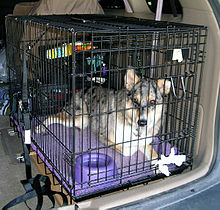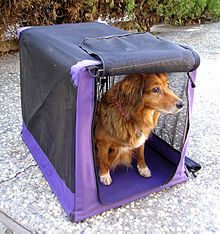- Dog crate
-
A dog crate is a metal, wire, plastic, or fabric enclosure with a door in which a dog may be kept for security or transportation. For best results in using crates, crate training is recommended. Dog crates are designed to replicate a dog's natural den and as such can provide them with a place of refuge at home or when traveling to new surroundings. The most common reasons for using a dog crate are for toilet training a new puppy, taking a dog on short trips inside the car, displaying them at the dog show or giving your dog a place to go when visitors come to your house[1].
Types of dog crates
There are many types of crates, and variations within the types:
- Solid plastic crates are usually more suitable than other types for secure travel, such as in an airplane. They might also be safer in a car accident than other types. Disadvantages are that they take up a lot of space and do not fold for storage.
- Aluminium crates can be either fixed or folding. A few of their advantages are: light weight, very strong when constructed with appropriate bracing, will not rust, excellent airflow & vision for the dog, appealing looks compared to wire crates. Aluminium crates are suitable for use at veterinary hospitals, car travel, as a permanent "den" for your dog inside the home and in breeding kennel environments.
- Wire crates usually can be folded for storage or transport, although it might be difficult to do and they are fairly heavy for their size. They provide more airflow for the dog and provide people with a clearer view inside and they range in size. Such crates are often used in car travel, at veterinary hospitals, and at kennels. There are a variety of covers and pads available to make crates safe and more comfortable.
- Wire crates are also popular at dog shows; they allow the dog to be clearly seen by spectators, and the sashes, rosettes and ribbons won can be hung on the crate for display.
- Soft crates can always be easily folded for storage or transport and are lightweight. They provide the dog with a stronger sense of security but still allow visibility and airflow. They cannot be used with dogs who are likely to dig or chew at the crate, and they are unsuitable for transporting dogs in any type of vehicle.
- Dog tents are a new alternative to soft crates. They offer many of the same advantages (and disadvantages) of soft crates but fold down to an even smaller size and are ultra lightweight so that they can be stuffed into tent bags and taken virtually anywhere. They make ideal enclosures for people who need to pack their soft crates into cramped vehicles or suitcases or for people who hike, camp or are involved in dog sports. Like soft crates, they are not suitable for puppies, dogs who are not housebroken, or for vehicle travel.
- ^ "Dog Crates Information & Advice". CratesDog.com. http://cratesdog.com/.
Categories:- Dog equipment
- Structures used to confine animals
- Dogs as pets
Wikimedia Foundation. 2010.


